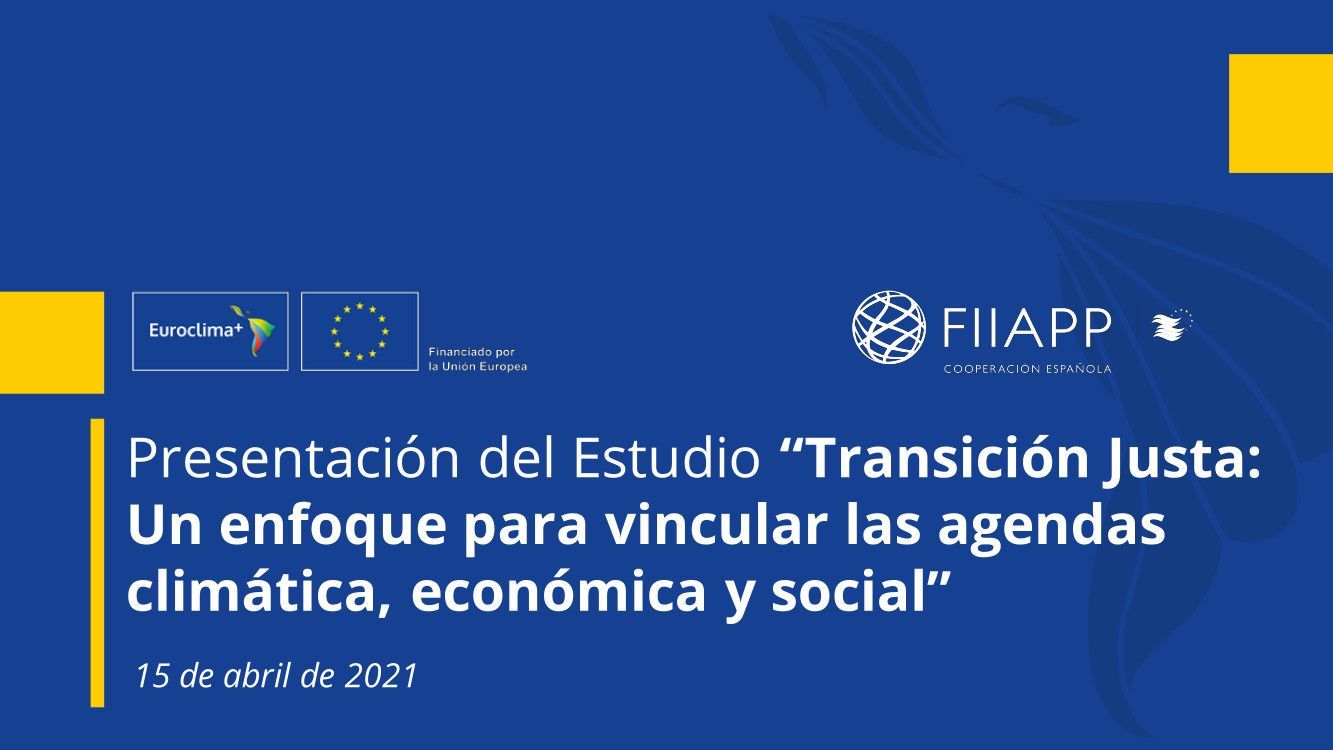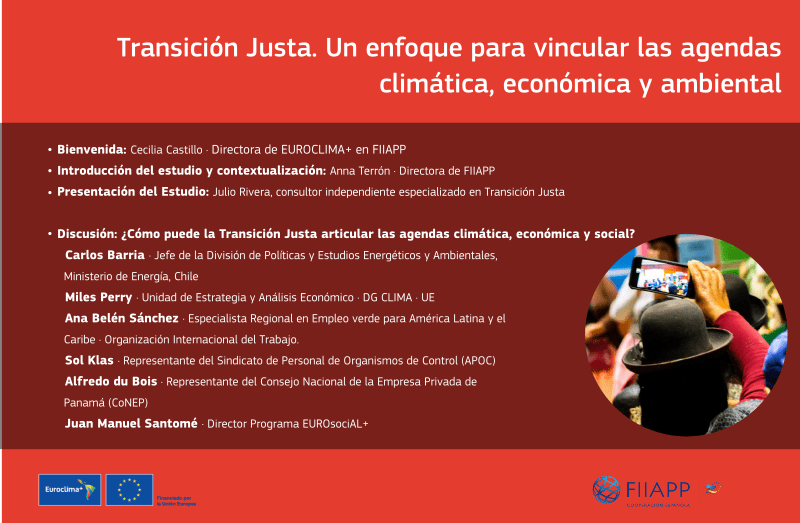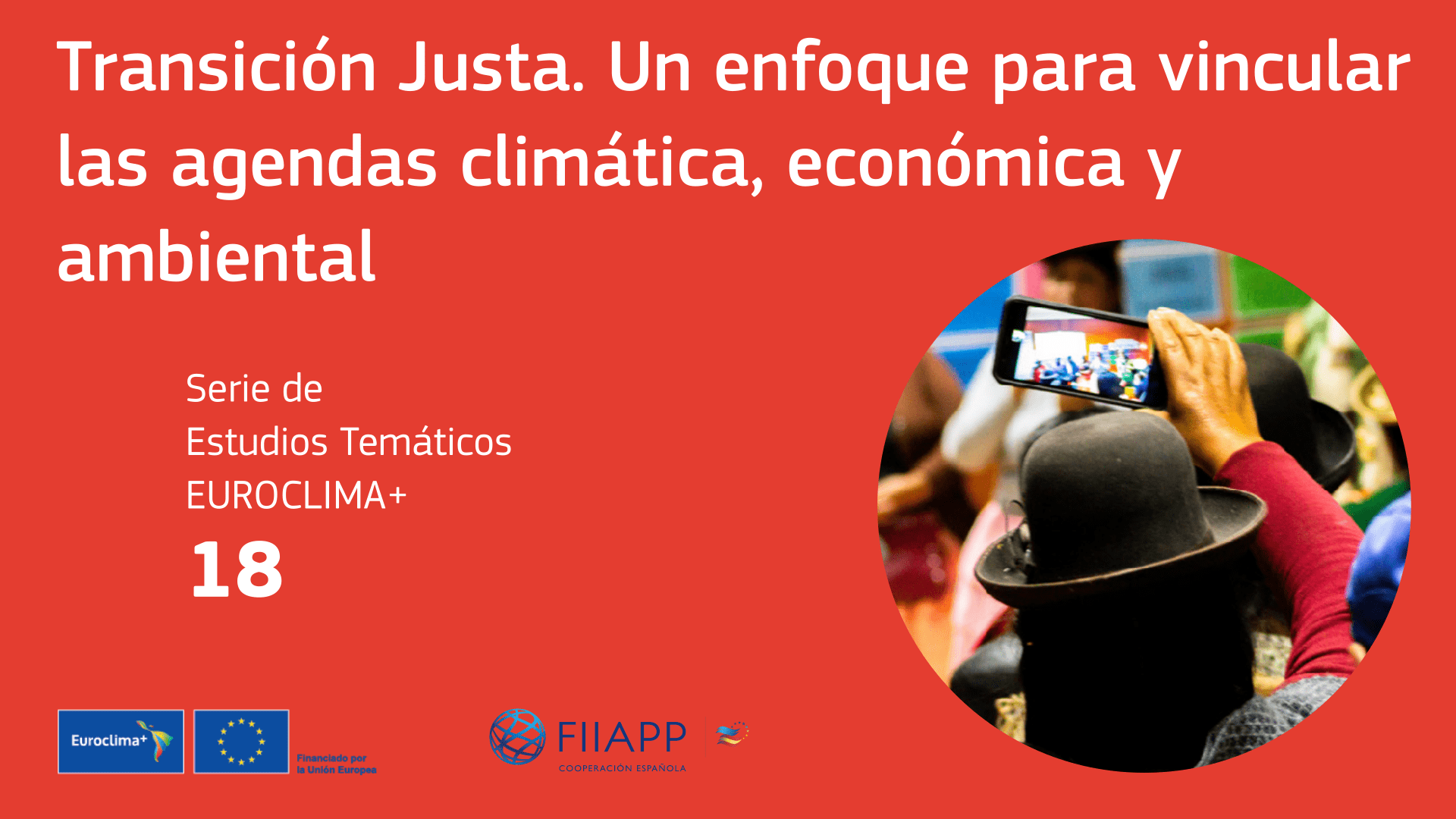The EUROCLIMA+ programme is holding an open virtual meeting to present its Thematic Study 18, and to analyse the potential and impact of tackling
the ecological transition with criia for economic and social justice.
Madrid, April 15.-The EUROCLIMA+ programme has held a new webinar to present the results obtained in the preparation of Thematic Study 18. Just Transition: an approach to link the climate, economic and social agendas, and to analyse the state of the art in the incorporation of this approach in the public policies of Europe and Latin America.
The Just Transition approach aims to address the differential social and employment impacts that decarbonisation processes will inevitably have on the socio-economic fabric of all countries. Key sectors in many countries, such as mining, fossil fuel energy or intensive food production, will be affected by the measures that are beginning to take shape in national legislation.
Key to the session was the perspective that the transition to a zero-emission economy is not only vital to avoid climate disaster, it can also stimulate a sustainable and inclusive economic recovery. This requires anticipating changes and adopting policy measures that are timely and effective; incorporating the just transition approach into recovery policies, as well as having specific and multi-sectoral policy instruments (JT plans or strategies) and ensuring their inclusion in key instruments (NDCs, LTS). The social and environmental challenges implicit in the Just Transition call for long-term actions, which require sustainable financing mechanisms and stable governance that will endure over time.
The Just Transition approach takes on its full meaning in Latin America and is emerging as a fundamental driver in the fight against inequalities in a transitional development scenario (LEO 2019). In a plural region, rich in biodiversity and with a multitude of gaps, it is essential to understand social cohesion from a multidimensional perspective, so that the Just Transition can contribute to sustainable economic, social and environmental development.
During the session different approaches to the concept of Just Transition was analysed from different perspectives; the state of progress in terms of Just Transition policies, strategies and action programmes in European and Latin American settings; the key actors involved; the main milestones; and the most relevant initiatives in the Latin American region.
After the presentation and introduction by Cecilia Castillo, Director of EUROCLIMA+ in FIIAPP, Anna Terrón, Director of FIIAPP, highlighted the relevance of the Just Transition agenda as a shared agenda that allows advancement in the complementarity of approaches in international cooperation.
Julio Rivera, independent consultant and expert on Just Transition, presented the main axes of the Thematic Study: Conceptual framework, sectoral drivers, status of Just Transition in the region, and a political agenda for Just Transition in Latin America.
Carlos Barria, Head of the Division of Energy and Environmental Policies and Studies, Ministry of Energy, Chile, presented the country's main advances in incorporating the Just Transition approach into its climate policies. "We demonstrate that, for Chile, carbon neutrality brings economic and social benefits, because Chile is fortunate to have a huge renewable energy potential." He highlighted the commitment to hydrogen they are carrying out, which is expected to bring a significant increase in direct and indirect jobs.
Ana Belén Sánchez, Regional Green Jobs Specialist for Latin America and the Caribbean of the International Labour Organisation, pointed out that, according to her forecasts, more than 22 million jobs could be created if decisions were taken that would lead to a decarbonisation of the region, against the 7 million expected job losses. The sectors in which this increase could be expected were identified as renewable energy production and related sectors --construction of green infrastructure, manufacturing, ... -. She highlighted the need for the involvement of labour ministries in the Just Transition agenda, thus far led mainly by environmental ministries. And finally, she drew attention to the importance of the gender perspective - with the gap linked to the informality of employment - in order to achieve a true Just Transition in the region.
Sol Klas, from the Staff Union of Control Agencies Control (APOC), Auditor General of Argentina, drew attention to the fact that the climate agenda is not a priority for the trade union movement today. "We have historical and recurrent arguments of deep economic and socio-environmental crises, with growing rates of inequality and increasing poverty. Therefore, it is logical to think that in the short term the priorities are focused on the generation of work and formal employment". He also suggested that the Just Transition approach presents an opportunity to overcome this vision. "The trade union movement does not yet identify the issue of decarbonisation of the economy as an opportunity to advance the transition to sustainable development.
Alfredo du Bois, National Council of Private Enterprise of Panama (CoNEP), addressed the two challenges identified by small and medium-sized enterprises for the transition towards sustainability: one, that any transition process must necessarily consider the entire production chain, not just energy generation, but also final consumption as companies are the main users of energy; and two, the financial variable must be considered in each of the links in this chain.
Miles Perry, from the European Commission’s Directorate General for Climate, presented the fundamental guidelines that are being adopted from the European Green Pact, with the Just Transition Mechanism as a fundamental tool, endowed with 100 billion euros.
Finally, Juan Manuel Santomé, Director of the EUROsociAL+ Programme, outlined the current framework for global reflection on future guidelines for international cooperation, with the complementarity of social, economic, and environmental agendas as the roadmap. He indicated the opportunity of the Just Transition agenda as a possible accelerator of the 2030 agenda, which focuses on the fight against inequalities, and its alignment with "development in transition" (LEO 2019) and the relevance of moving towards a new economic development model - green, digital, diversified, less dependent on extractivism - (LEO 2021) and the consequent relevance of building "new social pacts". He pointed out the possibility that the Just Transition approach could function as a lever for the construction of this new framework, taking advantage of the opportunities offered by the current context in both Europe and Latin America. "Latin America can continue to be a land of opportunity and innovation to develop this agenda and, therefore, a privileged laboratory for the rest of the world.”
Thematic Study 18. Just Transition: an approach to link the climate, economic and social agendas has been prepared by the International and Ibero-American Foundation for Public Administration and Policy (FIIAPP), with the collaboration of Teresa Cavero and Arantxa Guereña, in the framework of the EUROCLIMA+ programme, and with the objective of contributing to understanding the implications of the just transition agenda, identifying best practices and the status of appropriation and implementation in Latin America.
About EUROCLIMA+
EUROCLIMA+ is a programme funded by the European Union to promote environmentally sustainable and climate-resilient development in 18 Latin American countries, particularly for the benefit of the most vulnerable populations. The Programme is implemented under the synergistic work of seven agencies: the Spanish Agency for International Development Cooperation (AECID), the French Development Agency (AFD), the Economic Commission for Latin America and the Caribbean (ECLAC), the German Society for International Cooperation (GIZ), Expertise France (EF), the International and Ibero-America Foundation for Administration and Public Policy (FIIAPP), and UN Environment.
Contact
Daniel Fernández This email address is being protected from spambots. You need JavaScript enabled to view it.
PRESENTATION OF THE THEMATIC STUDY

